 |
 |
 |
| |
Aerobic Exercise Attenuates Cognitive Decline and Brain Volume Loss Associated With HIV.....from Jules: real-world exercise/diet intervention studies are need
|
| |
| |
......aerobic exercise improved cognition, increased brain volume.....a 50 yr old HIV+ who exercises has same brain volume as sedentary 40 yr old HIV+, exercise prevents decline with aging.....this study quantifies effects of exercise on brain health through neuroimaging......Subjects underwent neuroimaging and neuropsychological evaluations.....A cross-sectional cohort of 70 HIV+ individuals (19-82 age range) had neuropsychological performance (NP) testing, neuroimaging, and completed an extensive self-report AE questionnaire that split the cohort into physically active (n=22) and sedentary (n=48) groups..... from Jules: real-world exercise/diet intervention studies are needed
Reported by Jules Levin
CROI 2015, Feb 23-26, Seattle, WA
Brian Basco1, Mario Ortega1, Beau Ances1, Laurie Baker2, Jodi Heaps3, Florin Vaida4
1 Neurology, Washington University School of Medicine, St. Louis, Missouri, United States;3 Missouri Institute of Mental Health, St. Louis, Missouri, United States;2 Department of Psychology, University of Missouri St. Louis, St. Louis, Missouri, United States;4 Department of Medicine, University of California San Diego, San Diego, California, United States
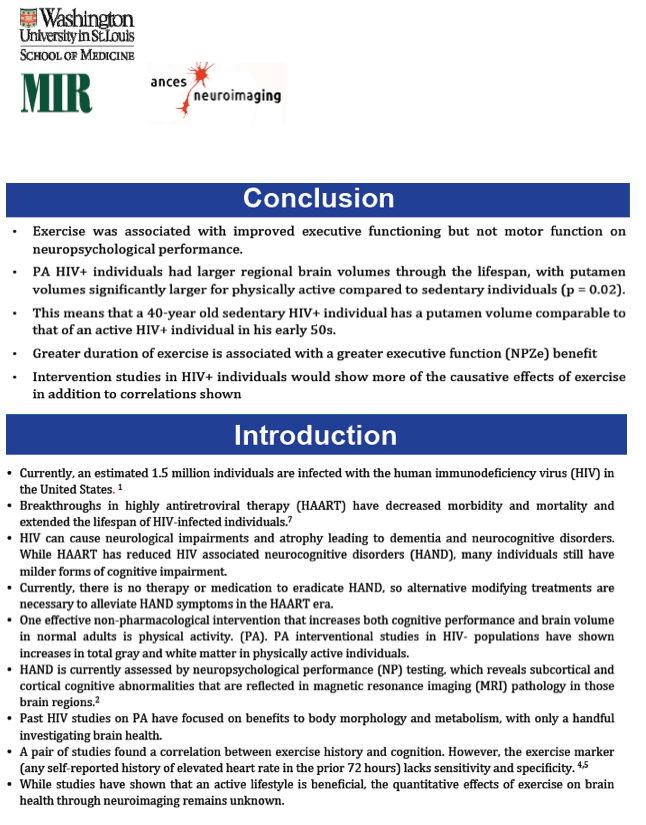
MET, Metabolic Equivalent, what is it?
http://sportsmedicine.about.com/od/glossary/g/MET.htm
http://en.wikipedia.org/wiki/Metabolic_equivalent
Measuring Physical Activity.....vigorous
METs.....http://www.hsph.harvard.edu/nutritionsource/mets-activity-table/
-----------------
program abstract
Abstract Body:
Background: HIV infected (HIV+) individuals are now reaching an advanced age, through stable treatment with highly active anti-retroviral therapy (HAART). However, HIV and aging are still risk factors for cognitive decline and neuropathologic deterioration seen in magnetic resonance imaging (MRI). Healthy lifestyle factors such as regular exercise may provide benefits to HIV+ individuals. Few studies have shown definitive benefit of aerobic exercise (AE) to HIV+ cognitive status, and none have used MRI. In this study we determine if a history of AE is beneficial to brain integrity and neurocognitive test scores in a cohort of HIV+ individuals.
Methods: A cross-sectional cohort of 70 HIV+ individuals (19-82 age range) had neuropsychological performance (NP) testing, neuroimaging, and completed an extensive self-report AE questionnaire that split the cohort into physically active (n=22) and sedentary (n=48) groups. Student's t-tests were used to analyze demographics. Analysis of variance (ANOVA) was used to study main effects of exercise on a brief NP battery, which consisted of the following tests: Trail Making Tests A and B, Hopkins Verbal Learning Test, Digit-Symbol Coding, F-A-S and Verbal Fluency. NP tests were grouped by executive and motor function for analysis. ANOVAs were also used to study the effects of exercise upon brain volumes. This included brain volumes affected by HIV, such as the caudate and putamen, regions affected by exercise, such as the hippocampus, and general brain regions like total gray and total white matter
Results: Active and sedentary HIV+ individuals were similar for age, sex, education, and laboratory values. Physically active HIV+ patients performed significantly better than sedentary HIV+ participants on NP tests of executive (p=.04, mean Z scores of -0.654 and -0.956 respectively, [95% CI, 0.27, 0.72]) but not motor function (p=.13, mean Z scores of -0.331 and -0.827, respectively). Additionally, physically active HIV+ individuals had a significantly larger putamen (p=0.028) across the lifespan compared to the sedentary cohort.
Conclusions: Across a range of ages, AE may maintain healthy brain volumetrics in HIV+ individuals and led to improved cognitive performance. Future studies should consider exercise as an adjunctive therapy to HAART for HIV+ individuals.
--------------------------

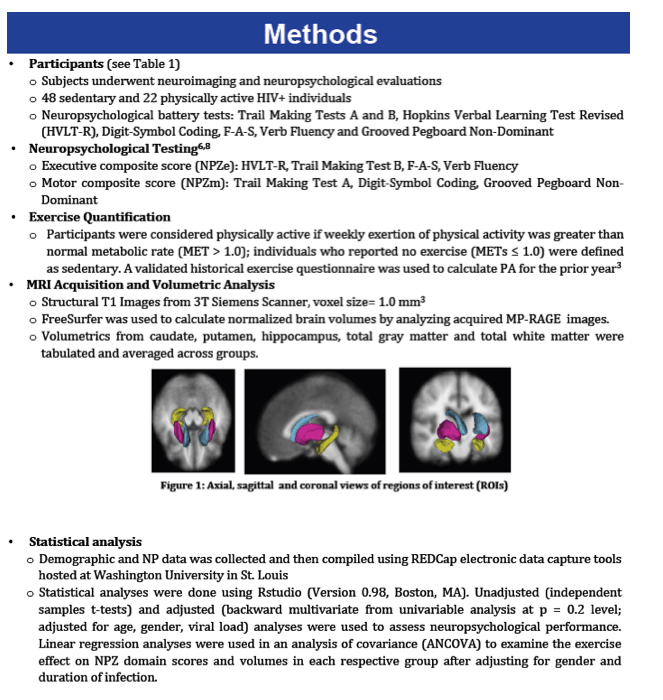
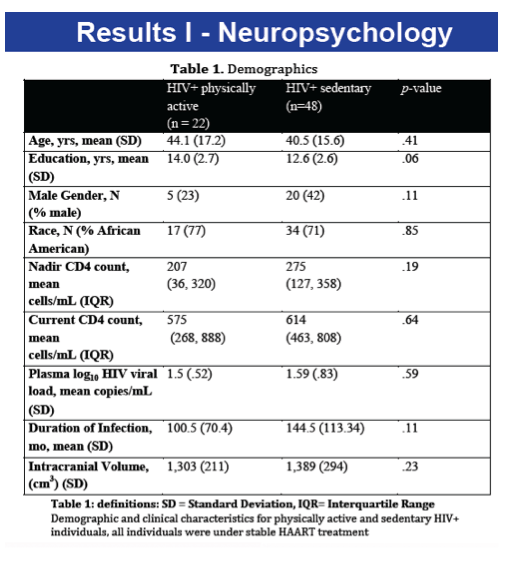
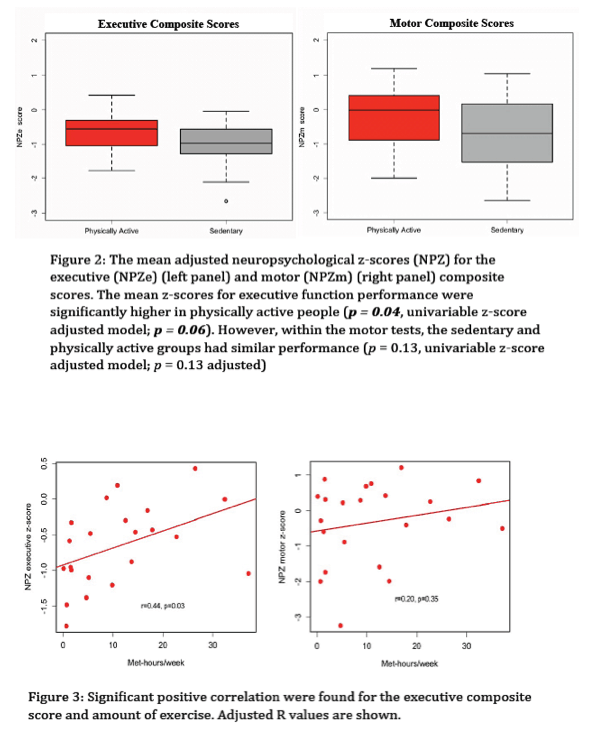
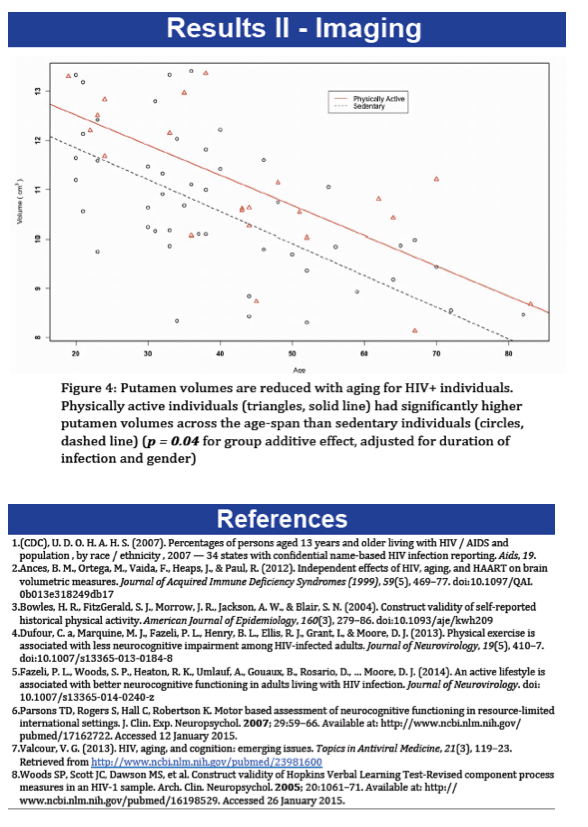
|
| |
|
 |
 |
|
|